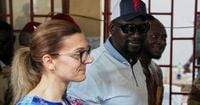Guinea, a West African nation rich in minerals and history, is preparing for a pivotal moment in its political journey. On December 28, 2025, Guineans will head to the polls for the country’s first presidential election since a military coup upended its democracy in 2021. This long-awaited vote, announced by presidential decree on state television, follows years of uncertainty, constitutional changes, and intense debate over the future of governance in the nation.
The announcement came on Saturday, September 27, 2025, just a day after the Supreme Court validated the results of a controversial constitutional referendum. According to AP and Devdiscourse, this referendum has cleared a legal path for General Mamadi Doumbouya, the coup leader who seized power four years ago, to potentially run for president. The implications of this moment stretch far beyond Guinea’s borders, echoing a broader regional trend of military takeovers and delayed returns to civilian rule across West and Central Africa.
General Doumbouya, who took power in 2021, had initially pledged to oversee a transition to democracy and even agreed in 2022 to launch a democratic process after a December 31, 2024, deadline. However, as AP reports, the ruling junta failed to meet this commitment, leading to widespread opposition protests that paralyzed the capital, Conakry, in January 2025. The frustration among the opposition was palpable, and the streets of Conakry became a stage for citizens demanding a return to democratic norms.
The constitutional referendum, which was central to the recent political developments, introduced sweeping institutional reforms. The new constitution, as confirmed by the Supreme Court, extends the presidential mandate from five to seven years and allows it to be renewed once. This is a significant shift from the previous arrangement, which limited terms to five years and, crucially, barred members of the ruling junta from running for office. Now, with the transitional charter replaced, General Doumbouya and other junta members are legally eligible to contest the presidency.
Official figures from the Supreme Court claim that the referendum passed with an overwhelming 89% approval and a reported 92% voter turnout. Yet, these numbers have not gone unchallenged. Opposition leaders have voiced strong skepticism, arguing that the reported turnout starkly contradicted their own observations of low voter engagement at polling stations. As Devdiscourse notes, this dispute over the legitimacy of the referendum process casts a long shadow over the upcoming election and has fueled a sense of mistrust among segments of the population.
The stakes of this election are high, not only for Guinea but also for the region and the global economy. Guinea is home to the world’s largest bauxite reserves—a mineral critical for aluminum production—and boasts the massive, untapped Simandou iron ore deposit. As Reuters and Devdiscourse highlight, the country’s political stability is of significant international financial importance. Investors and foreign governments alike are watching closely, hoping that a peaceful and credible transition can unlock Guinea’s economic potential and provide a model for stability in a region often rocked by coups and unrest.
The regional context cannot be ignored. Guinea’s coup was part of a wave of military takeovers that swept across West and Central Africa in recent years. While some countries, like Chad and Gabon, have held elections to formalize a return to civilian rule, others—such as Mali and Niger—have chosen to prolong transitional periods under military leadership. Guinea’s decision to move forward with an election places it at a crossroads: will it follow the path of democratic renewal or risk sliding back into authoritarianism?
The new constitution’s institutional changes go beyond just the presidency. It also establishes a new Senate, aiming to modernize the country’s political structure and, perhaps, provide a check on executive power. Still, the extension of presidential terms and the removal of barriers for junta members to run for office have raised concerns among democracy advocates and opposition groups, who fear that these reforms could entrench military influence rather than curtail it.
General Doumbouya’s intentions remain the subject of intense speculation. While the legal obstacles to his candidacy have been removed, he has not yet publicly declared whether he will run. According to AP, Doumbouya had previously stated he would not seek the presidency, but the landscape has shifted dramatically since then. The possibility of the coup leader transitioning from junta chief to elected president is both a source of hope for some—who see it as a step toward stability—and anxiety for others, who worry it could legitimize military rule under the guise of democratic process.
The international community, including regional bodies like ECOWAS, has been closely monitoring Guinea’s transition. The hope is that the December 28 election will be conducted freely and fairly, setting a positive precedent for other countries grappling with post-coup transitions. However, the shadow of disputed referendum results and ongoing political tensions means that the road ahead is anything but certain.
For ordinary Guineans, the upcoming vote represents both an opportunity and a test. After years of political upheaval, many citizens yearn for stability, economic growth, and a government that is accountable to the people. The election offers a chance to turn the page on a turbulent chapter in Guinea’s history, but only if it is conducted in a manner that is transparent, inclusive, and credible in the eyes of the public.
As December 28 approaches, all eyes will be on Guinea. The outcome will not only determine the country’s leadership for the next seven years but will also signal to the world whether Guinea is ready to embrace a new era of democracy—or whether old patterns of power will persist. The stakes could hardly be higher for a nation standing at the threshold of change.





